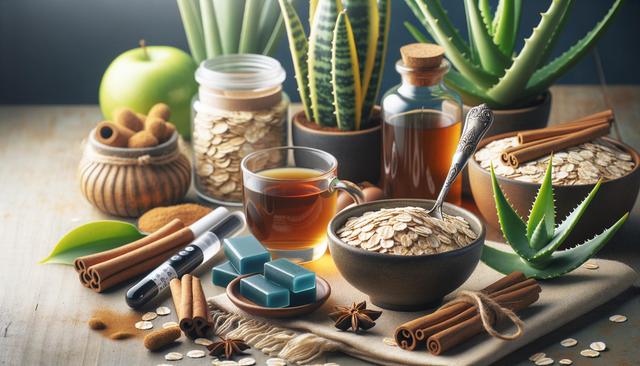Natural Ways That Might Help Lower Blood Sugar at Home
Explore natural home remedies that might help manage blood sugar levels. Learn about herbal solutions, dietary adjustments, and lifestyle changes that could complement your health plan. Discover practical ways to support your well-being.

Understanding Blood Sugar and Its Importance
Blood sugar, or glucose, is a vital energy source for the body’s cells. However, maintaining it within a healthy range is essential to prevent issues such as insulin resistance or diabetes-related complications. While medications and medical advice are central to effective management, several home remedies might offer complementary support for controlling blood sugar levels. These methods are not substitutes for medical treatment but could work alongside professional guidance to help individuals maintain better overall health.
Blood sugar levels can be influenced by various factors, including what we eat, how much physical activity we get, and even our stress levels. By understanding what affects glucose levels, individuals can make informed choices about daily habits. Home-based approaches often focus on diet, exercise, hydration, and natural herbs or ingredients that may have glucose-lowering potential.
Herbal Support from the Kitchen
Several herbs and spices commonly found in kitchens around the world have been traditionally linked to blood sugar support. These might help regulate glucose metabolism or improve insulin sensitivity when used appropriately. It’s important to use these in moderation and consult a healthcare provider, especially if you’re already on medication.
Some widely used herbs and spices include:
- Cinnamon: Often used in cooking and baking, cinnamon has been studied for its potential to enhance insulin sensitivity.
- Fenugreek seeds: These seeds can be soaked overnight and consumed in the morning, and may support glucose control.
- Bitter melon: Frequently used in traditional medicine, bitter melon might help lower blood sugar through compounds that mimic insulin.
- Ginger: Known for its anti-inflammatory properties, ginger may also play a role in glucose metabolism.
Incorporating these herbs into meals or teas could be a convenient way to potentially support blood sugar health without making drastic changes.
Dietary Adjustments That May Make a Difference
What we eat directly affects our blood sugar levels. Making thoughtful food choices can be a powerful way to support glucose control. Rather than focusing on strict dieting, the aim should be to build sustainable habits that emphasize nutrient-dense foods and balanced meals.
Some dietary strategies to consider include:
- Choosing whole grains over refined carbohydrates, such as brown rice or oats.
- Adding more fiber to meals through fruits, vegetables, and legumes.
- Consuming lean protein sources like legumes, tofu, or eggs to slow carbohydrate absorption.
- Opting for healthy fats, such as those from avocados, nuts, and olive oil.
Portion control is another critical element. Eating smaller, more frequent meals may help prevent spikes in blood sugar. Including a mix of macronutrients in each meal—carbohydrates, protein, and fat—can support more stable energy levels throughout the day.
Staying Active Through Simple Movements
Physical activity is a natural way to help the body manage blood sugar. Exercise helps muscles absorb glucose more efficiently, which can lead to lower blood sugar levels over time. You don’t need to engage in intense workouts to see benefits; even low-impact activities can make a difference.
Incorporate movement into your daily routine with options like:
- Brisk walking for 30 minutes a day.
- Stretching or yoga to reduce stress and improve flexibility.
- Light resistance training using body weight or household items.
Consistency is key. Try to find activities you enjoy so that it becomes easier to maintain a routine. If you’ve been inactive, start slowly and gradually increase the frequency and duration of your movements. Always consult a healthcare provider before starting a new exercise regimen, especially if you have existing health conditions.
Hydration and Sleep: Two Often Overlooked Factors
While herbs and diet often get most of the attention, other lifestyle factors like hydration and sleep are equally important for supporting blood sugar balance. Dehydration can lead to higher blood concentrations of glucose, so drinking enough water throughout the day is essential.
Tips for staying hydrated include:
- Carrying a reusable water bottle and refilling it regularly.
- Flavored water with slices of fruit or herbs for added taste.
- Limiting sugary beverages that may contribute to elevated glucose levels.
Sleep quality also plays a crucial role. Poor sleep can affect hormones that regulate glucose, potentially leading to higher fasting blood sugar. Aim for 7–9 hours of quality sleep each night and maintain a consistent sleep schedule. Creating a relaxing bedtime routine and limiting screen time before bed can improve sleep hygiene over time.
Conclusion: Supporting Blood Sugar Naturally
Maintaining healthy blood sugar levels is a continuous journey that involves a combination of medical guidance and personal lifestyle choices. While medications and regular check-ups remain essential, home remedies like using herbs, adjusting your diet, staying physically active, and focusing on hydration and sleep can provide additional support. These methods are not quick fixes but may help contribute to long-term wellness when used consistently and responsibly.
If you’re considering incorporating any new remedies or making significant changes to your routine, it’s always wise to consult a healthcare professional. Personalized advice ensures safety and effectiveness, especially when managing a condition like diabetes. With thoughtful habits and a balanced approach, it’s possible to take meaningful steps toward better blood sugar management from the comfort of your home.